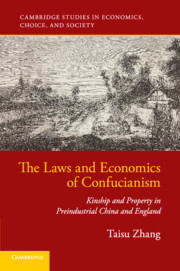Crossref Citations
This Book has been
cited by the following publications. This list is generated based on data provided by Crossref.
Hale, Matthew
Raymond, Graham
and
Wright, Catherine
2018.
List of publications on the economic and social history of Great Britain and Ireland published in 2017.
The Economic History Review,
Vol. 71,
Issue. 4,
p.
1360.
Du, Yue
2019.
Policies and Counterstrategies: State-Sponsored Filiality and False Accusation in Qing China.
International Journal of Asian Studies,
Vol. 16,
Issue. 2,
p.
79.
Zelin, Madeleine
2019.
A Deep History of Chinese Shareholding.
Law and History Review,
Vol. 37,
Issue. 2,
p.
325.
Zhang, Taisu
2020.
Beyond Information Costs: Preference Formation and the Architecture of Property Law.
Journal of Legal Analysis,
Vol. 12,
Issue. ,
p.
1.
Moreno García, Juan Carlos
2021.
Egyptology and Global History: Between Geocultural Power and the Crisis of Humanities.
Journal of Egyptian History,
Vol. 13,
Issue. 1-2,
p.
29.
Qu, Jian
2021.
Social Order through Contracts.
p.
25.
Wilmers, Nathan
and
Aeppli, Clem
2021.
Consolidated Advantage: New Organizational Dynamics of Wage Inequality.
American Sociological Review,
Vol. 86,
Issue. 6,
p.
1100.
Lin, Wanlin
2022.
Garnering sympathy: moral appeals and land bargaining under autocracy.
Journal of Institutional Economics,
Vol. 18,
Issue. 5,
p.
767.
So, Billy K.L.
and
So, Sufumi
2022.
The Cambridge Economic History of China.
p.
419.
Chang, Yun-chien
2022.
Property Rights: (Probabilistically) Necessary or Sufficient for Economic Development in China and Beyond?.
Law & Social Inquiry,
Vol. 47,
Issue. 2,
p.
727.
Zhang, Dewei
2023.
Struggling to Restore a Lost Identity: Hanshan Deqing’s 憨山德清 (1546–1623) Reforms at Nanhua Temple 南華寺, 1600–1610.
Religions,
Vol. 14,
Issue. 4,
p.
498.
Lowenstein, Matthew
2023.
Risk management in prewar China: A study of rotating savings and credit associations (ROSCAs) in Qing dynasty and Republican-era Shanxi province.
Business History,
p.
1.
Luo, Fusheng
2024.
Surveying, mapping, and translating: how property rights were created in Shanghai, 1860–1900?.
International Journal of Asian Studies,
p.
1.
Jheng, Shao‐yu
Koo, Hui‐wen
and
Wu, Kun‐jung
2024.
Property rights in a weak state: Evidence from land pawning in Qing Taiwan (1683–1895).
Asia‐Pacific Economic History Review,
Vol. 64,
Issue. 2,
p.
213.
Lowenstein, Matthew
2024.
Rotating savings and credit associations (ROSCAs) in prewar China: Communal finance and the roots of economic development.
The Economic History Review,
Vol. 77,
Issue. 3,
p.
796.
Jia, Ruixue
Roland, Gérard
and
Xie, Yang
2024.
A Theory of Power Structure and Institutional Compatibility: China versus Europe Revisited.
Journal of the European Economic Association,
Vol. 22,
Issue. 3,
p.
1275.
Mokyr, Joel
and
Tabellini, Guido
2024.
Social organizations and political institutions: why China and Europe diverged.
Economica,
Vol. 91,
Issue. 362,
p.
347.



